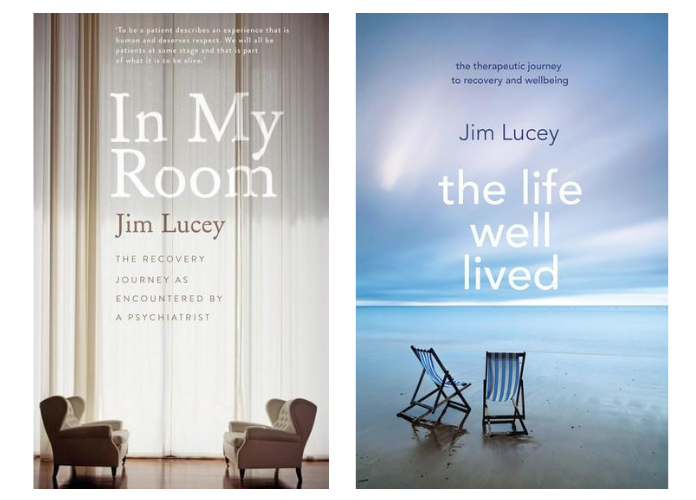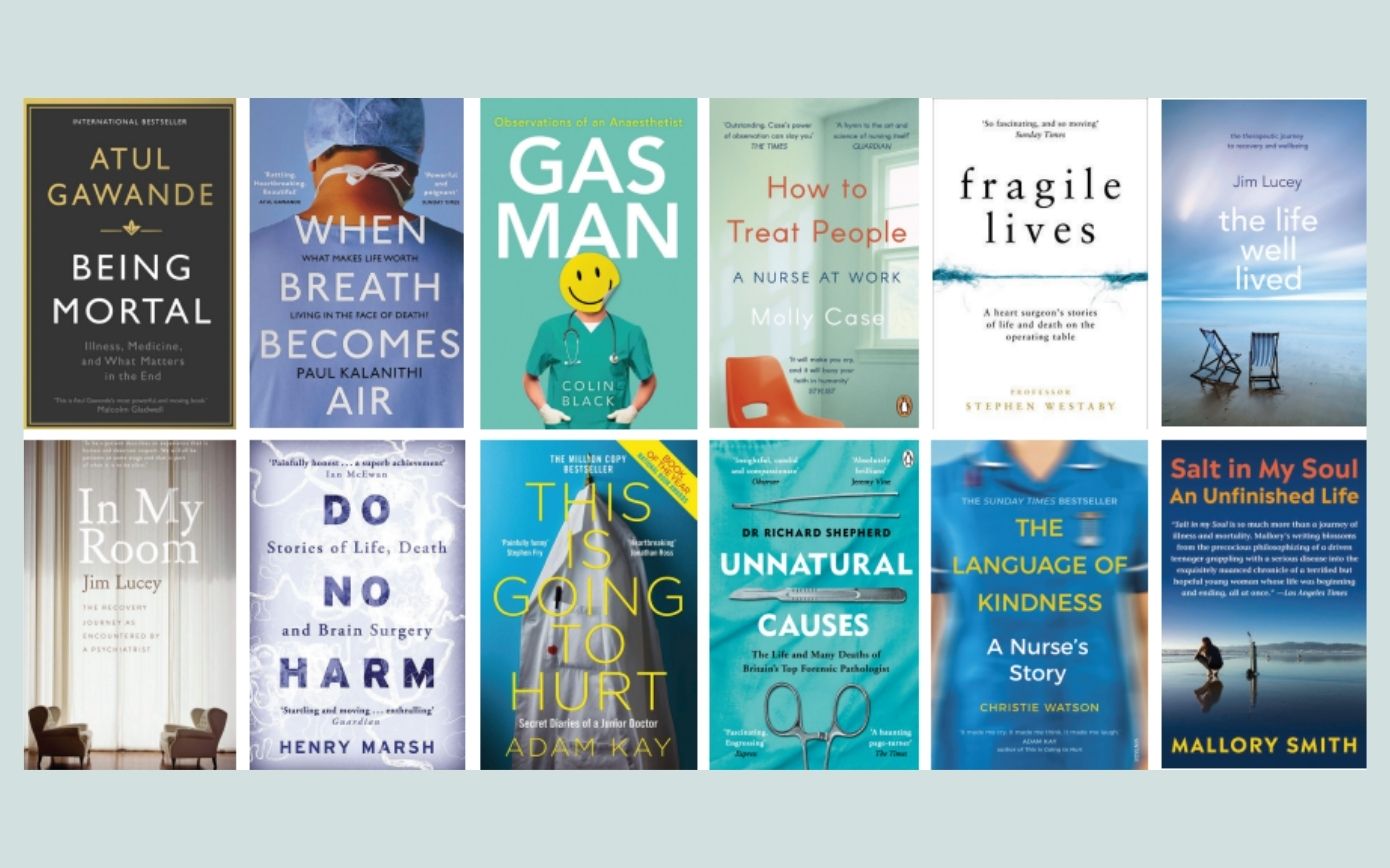There has been a flurry of memoirs in recent years detailing both the scientific and psychological aspects of the medical profession. Mixing personal history with medicinal history and insights into life on the ward, is the rise of the medi-memoir ultimately about human connection? Two Irish doctors share their thoughts and recommendations …
Jim Lucey MD PhD, is a clinical professor of psychiatry at Trinity College Dublin and consultant psychiatrist at St Patrick’s University Hospital. He is the author of bestselling books on mental health including In My Room and The Life Well Lived.

All doctors are writers. As students, we are taught that “it is better to publish than to perish” and so scientific writing becomes an essential part of our craft. In practice, we must write on behalf of our patients – providing reports and advocacy of one kind another, and so all doctors must write.
However, medical authors are not just writers who happen to be doctors, they are writers, and they are doctors. They hail from every perspective and every discipline of the healing profession, and include Saint Luke to James Joyce and Sigmund Freud.
I grew up in a house full of books; medical writers were prominent among those volumes. My uncles and my grand uncle were all doctors, and it was one of them who first introduced me to a great medical writer in Sir Arthur Conan Doyle. I received a Christmas gift of a collection of Sherlock Holmes stories when I was eleven years old. I remember reading A Study in Scarlet and being fascinated not by Mr Holmes but by Dr Watson.
As a youngster, I was also drawn to the stories of AJ Cronin, a Scottish physician famous for Dr Finlay’s Casebook (a popular TV series in the 1970s). His greatest work The Citadel is perhaps the most influential medical text I ever read. Its story captures brilliantly the ethical dilemmas of medical practice and it was rightly credited for its part in the formation of the UK NHS after the Second World War. Again it is a story of medical hope. My late mother, a GP who qualified in UCD in 1946, was one of the first women to work as a doctor in the new National Health Service (NHS). She was a great admirer of The Story of San Michele by Axel Munthe. This apocryphal memoir of a Swedish physician described the potential of authentic medicine.
Closer to home, in 1977 during my first year of studies at the Royal College of Surgeons (RCSI) in Dublin I enjoyed the stories of Joyce Delaney. Her hilarious memoir No Starch in My Coat – An Irish Doctor’s Progress describes the life of a young Irish woman studying medicine in the 1950s in UCD. It captures those times perfectly and illustrates the real heroism of a woman making a career in a male-dominated profession. It also describes in a very personal way an exciting period of innovation and reform of psychiatric practice after the 1960s.
Soon after qualifying in 1983, I received a gift from my sister Frances (an opera singer, not a doctor) of The Doctor Stories by William Carlos Williams, an American poet and GP. This is a realistic telling of his experience as a doctor and is as unsentimental as it is full of love for human beings. I read it again and again.
I have never been a great fan of medical autobiography. When I was still an undergraduate, I was given a copy of Christiaan Barnard’s autobiography One Life. His career of extraordinary achievement (he carried out the first heart transplant) made him a star in the 1960s and a controversial figure throughout his life, but the book was not a classic. His version of his pioneering surgery didn’t make for a good read. In contrast, the recent memoir by Henry Marsh, an English brain surgeon, entitled Do No Harm: Stories of Life, Death and Brain Surgery, is a cracking read. There is no less ego in Marsh’s work than there is in that of Barnard’s, but there is no question which of them is the better writer. Marsh’s work is refreshingly honest about the limitations of surgery and the difficulties for a human being who takes up this way of life.
Medical writing is best when it is about the people we care for rather than practice we lead.
Understandably, as a psychiatrist, I have been attracted by those writers who place the workings of the mind at the top of their agenda. In the 1980s Oliver Sacks did this with his great work The Man Who Mistook His Wife for a Hat. Psychiatry has always needed storytelling, not to compensate for a dearth of science, but to emphasise the human nature of psychological medicine. I like to recommend Anton Chekhov’s novella Ward No. 6 and other stories to all my students. Modern masters of this genre of storytelling include Irving Yalom with his Love’s Executioner and Other Tales of Psychotherapy, or Stephen Grosz’s The Examined Life. Special mention goes to Brendan Kelly, who wrote a magisterial history of Irish mental health called Hearing Voices as well as other works on historical figures such as his biography of Dr Ada English – patriot and psychiatrist. His output is really extraordinary – nearly a book a year – including the best-seller The Doctor Who Sat for a Year.
Latterly, there has been a resurgence of a genre of medical writing made popular by Richard Gordon – what we might call stories about hospital life. His Doctor in the House series were comic novels popular in the 1950s and 1960s which caught the spirit of the expanding health services and the comic experiences of young doctors in the growing hospital system. Modern versions of these tales are of a darker more obviously polemical kind. The House of God by psychiatrist Samuel Shem was very popular when I was a student. It is a flawed book by modern standards, but at its best it is a pioneering attempt to “tell it like it is” regarding the reality of hospital medicine. It came out in a more reflective time when the potential harm of industrial medicine was beginning to be understood. Books like Medical Nemesis by Ivan Illich – who was not a doctor – made this vista very clear. In recent times Atul Gawande has made a constructive response to this kind of medical writing. In contrast to Shem or Illich he is more hopeful for our services. His book Better: A Surgeon’s Notes on Performance is a masterpiece of its kind, showing us that we can do medicine “better” by rethinking everything we do.
Recent memoirs on the horrors of junior doctor’s life have taken the “doctor in the house” genre to a new level. This is Going to Hurt by Adam Kay is the most successful and the most accurate. Ultimately his vision of hospital medicine is a dispiriting one and so not surprisingly Kay does not recommend a career in medicine. [Kay will be at the Bord Gáis Energy Theatre on February 14; www.ticketmaster.ie]
During lockdown, I reread all the Arthur Conan-Doyle stories and realised how thrilling they remain. Though there are many other medical writers – for me medical writing is best when it is about the people we care for rather than practice we lead. The best medical writers write about human life in difficult times. Maintaining this focus may be more problematic now, especially for those of us working in today’s technological medical industry, but this human perspective is still worth rekindling. Thankfully it is still there, richly present, in the best work by medical writers through the ages.
Ronan Kavanagh, MD FRCPI, is a Galway-based rheumatologist and medical director of dotMD, a festival of curiosity for healthcare practitioners
While I believe people have always been interested in reading about life, death and illness, I think the explosion in medical memoir writing has come about as more and more doctors write to try and make sense of their own lives (and those of their patients) in a world of medicine which is changing rapidly. While there have been huge advances in medicine in recent decades, many doctors and other healthcare professionals are struggling, especially in environments where expectations are high, and resources are often limited. This is evidenced by the high rates of burnout, depression and suicide in the profession.
Medical memoir, through the telling of stories, attempts to rehumanise the lives of those humans who just happen to be doctors caring for humans who just happen to be patients.
dotMD is an attempt to do this on a broader scale by examining the practice of medicine through multiple lenses and from perspectives not usually included at medical conferences. It’s an attempt to reawaken the sense of wonder and curiosity about medicine that some may have lost along the way – and help doctors and healthcare professionals find deeper meaning and satisfaction in their working lives.
Anne Enright, Irish Laureate for Fiction, will give an address as part of this year’s programme in which there is a strong emphasis on storytelling. Writers speaking at dotMD 2022 will include Irish A+E doctor Dr Chris Luke (A Life in Trauma), US-based physician Dr Suzanne Koven (Letters To A Young Female Physician), British physicians Dr John Quin (Medicine Man) and Dr John Launer (How Not To be a Doctor) and psychiatrist (and comedian) Dr Benji Waterhouse (You Don’t Have To Be Mad To Work Here – which will be published in April 2023).
Following on from author Colum McCann’s suggestion at dotMD 2019 that doctors should begin to think like poets, we are delighted to introduce Martin Dyar – an Irish poet and editor of the forthcoming anthology Vital Signs: Poems about Illness and Healing.
While dotMD on June 17 – 18 is not open to the public all the talks will be available on YouTube through our website on www.dotmd.ie.
LOVETHEGLOSS.IE?
Sign up to our MAILING LIST now for a roundup of the latest fashion, beauty, interiors and entertaining news from THE GLOSS MAGAZINE’s daily dispatches.





